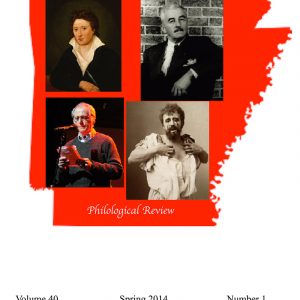calsfoundation@cals.org
Arkansas Philological Association
The Arkansas Philological Association is a learned society founded in 1974 at Arkansas State University (ASU). It put out Publications of the Arkansas Philological Association, an academic journal that became known as the Philological Review in 2001. The organization holds annual conferences at colleges and universities in Arkansas. These institutions support the Philological Review by offering editors release time and providing stipends for publication. This scholarly journal is indexed in the Modern Language Association (MLA) International Bibliography.
According to author James Turner, philology is “the multifaceted study of texts, languages, and the phenomenon of language itself.” Author John Peile wrote that philology “is the science which teaches us what language is.” The word philologia (φιλολογια) is found in the writings of Plato, and in the third century BC, Eratosthenes of Cyrene called himself philólogos (philologist). In 1697, Ars critica (The Art of Criticism) was published, providing a modern theoretical foundation of philology. The French philologist and linguist Jean-Francois Champollion deciphered Egyptian hieroglyphs in 1822 based largely on his study of the Rosetta Stone. This Egyptian monument dates from the second century BC and features the same text in hieroglyphs, Greek, and demotic Greek.
The Arkansas Philological Association has a wide range of interests. For example, the 2011 Arkansas Philological Association conference cosponsored a public reading at the Faulkner County Library of Surreal Killer, a posthumous novel by Roy Trask (a.k.a. David Arnott).
The 2015 edition of the Philological Review (Volume 41, Number 1), edited by Andrew Nelson, was published by the University of Arkansas at Monticello (UAM). The issue commemorated the organization’s conference at ASU, which included a tour of the Hemingway-Pfeiffer Museum and Educational Center, located in Piggott (Clay County). Other special issues of the journal include “Robert Penn Warren at 80,” an anniversary issue in 1985 that was edited at East Texas State University at Commerce, Texas; a 1989 issue “in honor of Principal Members of the Department of English Hendrix College” (Volume 15, Special Number), being a collection of writings intended to honor scholarly achievement—known in academia as a festschrift; a 2006 issue “in honor of Dr. Robert Stevick, with essays on Old English works” (Volume 34, Number 2); and a 2016 double issue focusing on William Faulkner (Volume 42, Numbers 1–2), edited by Dr. Terrell Tebbetts.
The Arkansas Philological Association does not have a fixed center, new board members are elected annually, and the peer-reviewed Philological Review rotates through different colleges and universities, as do the annual conferences, where scholarly papers are presented by members largely representing English and foreign language departments in Arkansas and neighboring states.
For additional information:
Arkansas Philological Association. https://arkansasphilologicaldotcom.wordpress.com (accessed October 4, 2022).
Peile, John. Philology. London, England: MacMillan and Co., 1880.
Turner, James. Philology: The Forgotten Origins of the Modern Humanities. Princeton, NJ: Princeton University Press, 2014.
Allen McMillan
Little Rock, Arkansas







Comments
No comments on this entry yet.